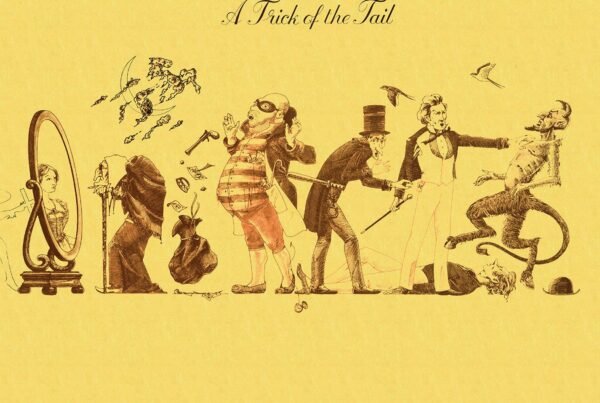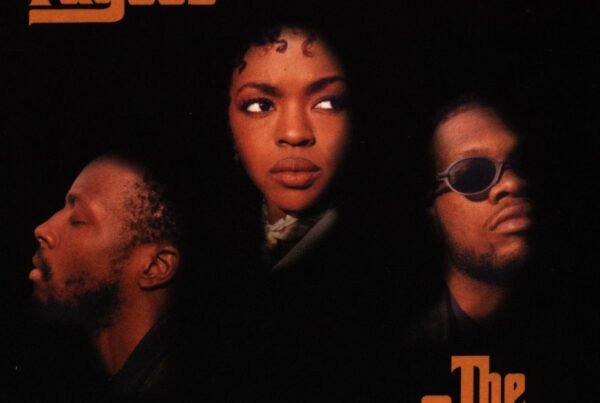Metalcore sits in a very weird place in terms of recognition and overall musical quality. On the one hand, its reputation shall be tainted forevermore because it’s single-handedly responsible for some of the most egregious smut to enter our ears over the past two decades, but on the other nobody can deny that it gave rise to a number of absolutely mind-boggling, timeless releases that stand among the very best metal as a wide genre umbrella has to offer. One such album is the object of scrutiny we have chosen for this episode of A Scene In Retrospect: Digital Veil by the sadly missed The Human Abstract. To discuss this milestone record, I drummed up a team consisting of EIN editor-in-chief Landon, assistant editor Alon, and staff writers Rodney and Pete; read their takes on Digital Veil below!
Landon Turlock
If one word defines The Human Abstract’s third and final album more than any other, it is intention; every second matters, and builds from one moment to another with grace. From the opening nylon strings of “Elegiac” to the anthemic end of “Patterns”, Digital Veil is a masterclass in creating movement and anticipation in metal, applying classical structures to heavy music in a seamless way. Such tension and release culminates in some of my favourite moments in metalcore, with the millisecond pause that breaks from 0:48 to 1:00 in “Complex Terms”, making those twelve seconds all the more powerful. However, this pacing is perhaps no better illustrated than with the album’s midpoint and longest track: “Antebellum”. With its hard-hitting opening, unique nylon-string-meets-Muse verse, and absolutely epic mid-section, we see The Human Abstract, with painfully underrated guitarist A.J. Minette at the helm, master song structures that both evolve and surprise in a way that no one else in metalcore has quite done before or since.
And while I think that Digital Veil is at or near the pinnacle of progressive metalcore, it has its flaws. Travis Richter’s voice made for a unique addition to the band, and the record wouldn’t be what it is without his layered, lower-register screams and choir-like vocal arrangements; I could not imagine previous vocalist Nathan Ells’ raw hardcore influence matching the grandiosity of Digital Veil’s instrumentation in the same way. Nonetheless, neither the mix nor Richter’s occasional lack of confidence give his performance quite the clout it deserves. And although producer Will Putney’s legendary touch is evident, the production on the album does not quite stand the test of time with some cheesy, on-the-nose effects (the digital fade-out of the title track) and a heavily compressed, guitar-heavy mix.
Regardless, Digital Veil accomplishes more in eight tracks and thirty-seven minutes than many artists do in an entire career: providing a blueprint for neoclassical modern metal that has shaped the output of artists from various genres since its release. Although I am sad that we are unlikely to ever hear more from The Human Abstract, I could not ask for a stronger finale than Digital Veil.
Rodney Fuchs
As a fan of neoclassical music and classical music in general, I must say that The Human Abstract is the logical consequence for all like-minded metalheads. Digital Veil consolidates classical techniques and metal guitars with a very progressive attitude that makes this record a true progressive metal album. But how can something that uses old techniques be progressive? It’s the overall sound and usage of technical guitars that stands out in a progressive habit. The vocals on Digital Veil are often backed by the guitars to create anthemic melodies that are interrupted only by prog metal riffing and prog rock traits.
An aspect that is really noteworthy in comparison to modern prog metal bands is that The Human Abstract always kept their organic sound. The guitars deliver the warm and earthy tone established by 2000s metal, which somehow got lost over the last ten years. Big choruses like the one in “Faust“ even deliver a decent catchiness, due to the grandiose melody lines. Also, the piano interlude in said song is played so well before it transists into this dancy-circus part! “Holographic Sight“ has this super rhythmical component that djent-associated bands can only be jealous of nowadays.
Those clean parts in between the riffing and wild guitar melodies are composed with great musical knowledge. When I think of the title track, I always remember this certain dark and oppressive feeling it delivers. The sweeps, the groove, and the rhythmical aspects make this song one of the best that The Human Abstract ever created. In direct comparison, Digital Veil feels more stable and developed than the band’s first records. This shows up in the transitions and proggy elements in between the parts. At some points, the band even works with a Necrophagist-ian way of writing their riffs, which is simply stunning.
I’m still sad about the fact that The Human Abstract broke up, and still hope that all those rumors are true. I need a follow-up!
Pete Overell
Digital Veil is a timeless classic that escapes definition, has split fanbases, and has left me desperate for more since 2011. It, and The Human Abstract in general, have an easily distinguishable sound unlike no other in my opinion; the beautiful sweeping guitars, incredible drums, and soul-crushing vocals take form to create a sound so rich, emotive, and harrowing, it is still hard to pidgeon-hole.
Certain imagery always springs to mind when I listen to this album. I picked up Digital Veil a few months after its release, coinciding with the release of Deus Ex – Human Revolution. The album fit the vibe perfectly – dark and bleak dystopia – and to this day, I’m reminded of dingy futuristic suburbs and copious bionic augmentations when listening to the record.
From the introduction all the way through to the mind-blowing speed of the final track, this album takes the listener on a journey. The return of AJ Minette was crucial to this record’s success, his guitar work being one of the reasons it stands out so much. Travis Richter’s vocals also made this record so loveable, the lyrics he delivered powerful and his tones balanced.
Picking favourite tracks is impossible with this record – even the introductory track “Elegiac” is brilliant. “Complex Terms” introduces us to Richter’s vocals in emphatic form, with incredible vocal hooks and melody lines delivered from start to finish. The destitute look at humanity resonates with me heavily, and the neo-classical tuning of the guitars and emphatic nature of the other instrumentation gives a brutal feel to this song.
The title track of the album is also its heaviest, with Richter not letting up for a second and the general pace being fast and furious. It is an amazing track to headbang and scream along to, and I only wish I could’ve caught it live back when it was released. This certainly doesn’t imply the album is front-loaded; the final three tracks rip your brain to shreds with massive solos and movements. I can’t imagine a day when I’ll put on this album and not enjoy it from start to finish. This monument was not built by thieves, rather by pioneers in their art. Here’s hoping the reformation rumours hold true.
Alon Shaul
During my high school music class, I was introduced to different musical eras right at the time when I started diving into the metal musical scene. Immediately, I sensed similarities between the Baroque and Classical periods and metal, both in composition and emotions implemented into the music. This helped me fall in love with both musical sceneries, and I started appreciating composers’ innovation, especially in terms of integration of different musical genres, one into the other.
The Human Abstract’s Digital Veil is a perfect example of how hundred year-old musical ideas can still be implemented so smoothly into a driving force of modern progressive metal. You can sense it from the very beginning with the opening prelude “Elegiac”, which immediately sets the stylistic tone towards what is about to unfold.
With your permission, I’d like to jump to the last two tracks of the album, as both of them exhibit complex compositions that, if played on ‘classical’ instruments, might have taken you to a whole different musical image in your mind. The structure of the album’s closer “Patterns” reminds me of Beethoven’s Moonlight Sonata, only faster-paced. “Horizon To Zenith” just bursts of intriguing musical ideas right from the kick-off. Close your eyes, and try to imagine how an orchestral stringed instrumentation could carry out the beginning of the song so well, and the acoustic guitar that joins 43 seconds into the song? It is actually played by the harp, and accompanies an opera choir, beautifully harmonized.
My favorite song on this masterpiece has to be “Antebellum”. The same classical elements are scattered throughout every part of this 7:30 minute-long track. Let me take you onwards to an absolute phenomenal and intense movement, starting at 4:01 to 5:35 – we all know these crushing, dominating, heavy parts on oh-so-many different metal songs, which in many other examples tend to sound too similar.
Well, this one happens to be a great example of how to keep it fresh and exciting: the aggressive vocal drive is obviously there, but take a good listen to the instrumentation that accompanies Travis Ritcher’s immense screaming. They could have ‘settled’ on simpler riffs that would probably still be able to deliver the same statement, but The Human Abstract do not wish to waste any valuable second on traditional, and perhaps even overused metal patterns. It gives this segment a whole new dimension, and personally? I always feel it, overwhelmed by the emotions that floods into the surface.
I could go on and on with this record. There’s so much to it, and I guess every listener finds their own ways to communicate with it. In any case, I feel that it has, and always will be, a must-listen, at least for metal fans out there. This record remains different and innovative, in a genre that in many cases tends to dwell in mediocrity, thirsty for new ideas.
Initiating conclusion process…please stand by…initiation successful…booting generic final phrases 101english.exe…closing trite joke.exe…That’s all for this episode of ASIR, I’m afraid. While I’ve got you here, what are your thoughts on this band/album? Would you like to propose some records to include in this feature? Leave it all in the comments!
Entering mandatory send-off protocol…Hopefully I’ll see y’all back here in fourteen days for another look back at a classic record. I can already guarantee you that it’ll be a doozy, so don’t miss out! Until then, stay safe, and as always…
…thanks for reading!






